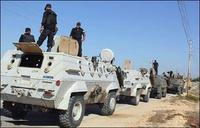-
White House to curb NSA monitoring of some allies' leaders
It appears that President Obama will soon instruct the NSA to stop eavesdropping on leaders of close U.S. allies. It now emerges that both the president and Congress’s intelligence committees were kept in the dark about this aspect of the NSA surveillance program. Yesterday’s indication by the White House that it moving toward banning the NSA from eavesdropping on some foreign leaders is a historic change in the practices of an agency which has enjoyed unlimited and unfettered – and, it now appears, unsupervised – freedom of action outside the borders of the United States. The move is similar to, if more complicated than, the limits imposed on the CIA in the mid-1970s. Security experts note, though, that prohibiting the NSA from eavesdropping on some foreign leaders would be more complicated and potentially more damaging to U.S. interests than the prohibitions imposed on the CIA more than three decades ago.
-
-
Russia to improve image by developing patriotic video games
The Russian government has complained that the videogame is “Company of Heroes,” which is popular among Russian teenagers, distorts history by depicting a Second World War Russian soldier as a criminal and arsonist. The government is considering banning the game – and has also launched its own videogame project to produce games which contribute to “patriotic education.” In the meantime, a Belgian videogame developer is set to release a mobile game, titled “You Don’t Mess with Putin,” which depicts Russian president Vladimir Putin and a fictional sidekick, an alcoholic American named Mike, battling zombies who attack a Putin news conference.
-
-
Experts question ambitious Syria chemical weapons agreement
The announcements in Geneva by Secretary of State John Kerry and Foreign Minister Sergey Lavrov were bold: President Bashar al-Assad has a week to provide detailed, accurate, and comprehensive information about Syria’s entire chemical weapons program: research labs, production facilities, test sites, chemical storage depots, and munitions kept by every military unit. Experts say that the tight timetable the agreement requires for disclosure of stockpile, destruction of production facilities, and the destruction of the chemical weapons themselves, would not only set a speed record, but that that it cannot be accomplished even with Syria’s full cooperation.
-
-
Obama: Russia’s chemical weapons proposal may be a “significant breakthrough”
President Obama on Monday described a Russian proposal for Syria to turn over control of its chemical weapons to international monitors in order to avoid a military strike a “potentially positive development,” which could represent a “significant breakthrough.” Obama said, though, that the proposal should be taken “with a grain of salt,” and it was viewed with some skepticism by the administration, with senior officials saying the proposal could possibly be a delaying tactic aimed to undermine Obama’s already tenuous efforts to push for a military strike. The Russian proposal called for Syria to open its chemical weapons stocks to international inspections and give complete account of its stocks; begin the process of supervised destruction of these weapons; and join the Chemical Weapons Convention.
-
-
New analysis suggests war has not disappearing

While some researchers have claimed that war between nations is in decline – see, for example, Steven Pinker’s 2011 book The Better Angels of Our Nature: Why Violence Has Declined — a new analysis suggests we should not be too quick to celebrate a more peaceful world. New study finds that there is no clear trend indicating that nations are less eager to wage war. Conflict does appear to be less common than it had been in the past, but this is due more to an inability to fight than to an unwillingness to do so.
-
-
Imported food: Shifting from catching problems at the border to preventing them at the source
The Association of Food and Drug officials (AFDO) has published its guidance document for improving imported food safety. The document, entitled “Issues and Concerns with Imported Foods,” was released ahead of the U.S Food and Drug Administration’s (FDA) release of two rules on the same issue. The FDA aims to shift from a regulatory system that focuses on catching problems at the border and into a prevention system to correct issues before they reach the American border.
-
-
Israel, Egypt escalate attacks on militants in Sinai Peninsula (updated)

The growing intelligence cooperation between Egypt and Israel was in evidence early Friday when the Israel Air Force (IAF), in coordination with the Egyptian military, used drone strikes to destroy ready-to-launch rockets and rocket launchers on Egyptian territory, killing five Egyptian militants in the process. The rockets were deployed on Thursday in a desert area near the town of Rafah, and were discovered by an Egyptian surveillance fly-over. On Saturday, the Egyptian air force attacked militant positions in the area, killing twelve Islamists.
-
-
DHS returns Saddam Hussein’s sword to Iraq
A ceremonial sword taken from the office of deposed Iraqi dictator Saddam Hussein was returned to Iraq Monday. It appears the sword was taken from Saddam’s office by an American soldier, who last year gave it to an auction house to sell. DHS agents seized the sword in January 2012, after it had been sold but before money changed hands.
-
-
Turmoil in Turkey is about the future identity of the country

The demonstrations in Istanbul began as a neighborhood protest against the government’s plan to build a shopping mall on the site of a popular park. Soon, however, the demonstrations spread to other cities, and spokespeople for the demonstrators emphasized that the park issue was symbolic, and that it stood for deeper issues. This growing unrest may yet unleash deeper forces within Turkish society.
-
-
White House closer to decision on providing arms to rebels in Syria
White House spokesman Jay Carney declined to deny reports that President Barack Obama is seriously considering providing arms and other military gear to rebel groups in Syria. The president last year said that the use of chemical weapons by the Syrian regime would constitute crossing of a “red line” and would be a game changer.” Still, haunted by how false intelligence about weapons of mass destruction in Iraq led to the 2003 invasion of the country, the Obama administration appears to demand a higher level of evidence about the chemical weapon use in Syria.
-
-
Arab League’s Mid East peace proposal accepts Israel’s position on borders

In a major coup for the Obama administration, representatives of the Arab League announced Monday in Washington that they were reaffirming two earlier initiatives by the league to end the Arab-Israeli conflict – and made the current peace proposal even more acceptable to Israel.
-
-
U.S., South Korea delay nuclear fuel deal
The president of South Korea, Park Geun-Hye, has been campaigning to get the United States to lift the ban on South Korea from enriching uranium and processing spent nuclear fuel. The ban was part of a 1972 treaty, which was set to expire next March. A deal appeared to be on the way at some point this year, but officials from both countries said the deadline would be extended to 2016. What did not help the negotiations were statements by some South Korean officials that the country should build its own nuclear weapons reather than rely on U.S. nuclear umbrella.
-
-
U.S., China in high-level military talks
Representatives of China and the United States met on Monday for the highest-level military talks between the two counties in almost two years. In the meeting, a senior Chinese general pledged to work with the United States on cybersecurity because the effects of a major cyber attack “may be as serious as a nuclear bomb.”
-
-
China catches 12 times more fish beyond its waters than it reports
Chinese fishing boats catch about $11.5 billion worth of fish from beyond their country’s own waters each year — and most of it goes unreported. Researchers estimate Chinese foreign fishing at 4.6 million tons per year, taken from the waters of at least ninety countries — including 3.1 million tons from African waters, mainly West Africa.
-
-
DHS helps tear down technological “Tower of Babel” along U.S. borders
First responders and international officials on both sides of the U.S.-Canadian border had been preparing since last fall for the Canada-U.S. Enhance Resiliency Experiment (CAUSE) — demonstrating the ability to exchange information between local, state, provincial, and national systems and software applications. With these preparations, a recent joint experiment held in Maine and New Brunswick proved that even across borders, any immediate confusion or lack of information following an incident should not greatly affect overall rescue efforts.
-
- All
- Regional
- Water
- Biometrics
- Borders/Immig
- Business
- Cybersecurity
- Detection
- Disasters
- Government
- Infrastructure
- International
- Public health
- Public Safety
- Communication interoperabillity
- Emergency services
- Emergency medical services
- Fire
- First response
- IEDs
- Law Enforcement
- Law Enforcement Technology
- Military technology
- Nonlethal weapons
- Nuclear weapons
- Personal protection equipment
- Police
- Notification /alert systems
- Situational awareness
- Weapons systems
- Sci-Tech
- Sector Reports
- Surveillance
- Transportation
Advertising & Marketing: advertise@newswirepubs.com
Editorial: editor@newswirepubs.com
General: info@newswirepubs.com
2010-2011 © News Wire Publications, LLC News Wire Publications, LLC
220 Old Country Road | Suite 200 | Mineola | New York | 11501
Permissions and Policies
Editorial: editor@newswirepubs.com
General: info@newswirepubs.com
2010-2011 © News Wire Publications, LLC News Wire Publications, LLC
220 Old Country Road | Suite 200 | Mineola | New York | 11501
Permissions and Policies
